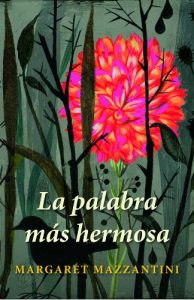"Nobody really happy is a writer" was a phrase of Margaret Mazzantini which I found curious. Above all because it is a perfect concept on which to advance the essence of the craft of writing, and also the foundations of happiness. In the end, no one is happy all the time. The point is to take advantage of unhappiness. And then yes, writing takes on all its meaning. Don't you think so, Margaret?
La creative unhappiness by Mazzantini It ends up assaulting us from a brilliant intimacy open to all sorts of contradictions, exposing us to the usual cold of living of those who delve into the underlying existentialism from our reality, as if navigating between the waters that move at the phreatic level of being.
With some inspiration to Erri de Luca, under a similar sinuous line that he traces from the inner world of the characters to end up outlining the cosmos, Mazzantini preaches a literature towards discovery. I am not referring by any means to self-help, but to introspection from empathy, to narrative mimicry necessary if we want a novel to end up leaving us dregs. The result, the transformation of the characters, the liberation or at least their struggle ...
Top 3 Recommended Novels by Margaret Mazzantini
Do not move
Mazzantini's second novel already got that great echo from the confirmed writer on her arrival from the interpretation.
A shocking look at the bad conscience of a well-to-do man. In an Italian hospital, Timoteo, a prestigious surgeon, watches over his daughter Angela, a 15-year-old girl who is in a coma after a motorcycle accident. Overcome by pain and remorse, Timoteo seeks refuge in words and begins a heartbreaking monologue in which he faces the ghosts of a dark past that continues to embarrass him.
Do not move, Margaret Mazzantini's dazzling debut, was for more than two years on the best-seller lists in Italy and has captured thousands of transalpine readers with her lucid vision of the miseries of double standards. Strega Award 2002.
The most beautiful word
It is night in Rome, everyone is sleeping, but the phone suddenly rings. A voice from afar invites Gemma on a trip to Sarajevo, the city where the deepest emotions of her life were born and died.
There, between the outbreaks of a cruel and useless war, Pietro was born sixteen years ago, a boy who now calls her mother and is as beautiful, healthy and selfish as any other adolescent. Pietro does not know its origin well and does not know that in the narrow streets of that besieged city Gemma lived a love story of those that stick to your bones and change you forever.
Now, back to those lands, mother and son will have to face a past that hides secrets, bodies that still bear the traces of an ancient pain, but along the journey they will also learn new words, those that help us to make sense of our mistakes and continue to bet on a new beginning for all.
Splendor
We can see ourselves as brilliant when we reach or at least border or orient ourselves towards that plenitude capable of shedding the impressions, labels and budgets of others and our own. That is the splendor that this novel addresses. Will the day come when we have the courage to be ourselves? This is the question that the two unforgettable protagonists of this novel ask themselves.
Two children, two men, two incredible destinations. One is fearless and restless; the other, suffered and tormented. A shattered identity that needs to be put back together. An absolute connection that imposes itself, the blade of a knife on the edge of the precipice of an entire existence. Guido and Constantino move away, kilometers of distance separate them, they establish new relationships, but the other's need resists in that primitive abandonment that takes them to the place where they discovered love. A fragile and virile place, tragic as denial, ambitious as desire.



